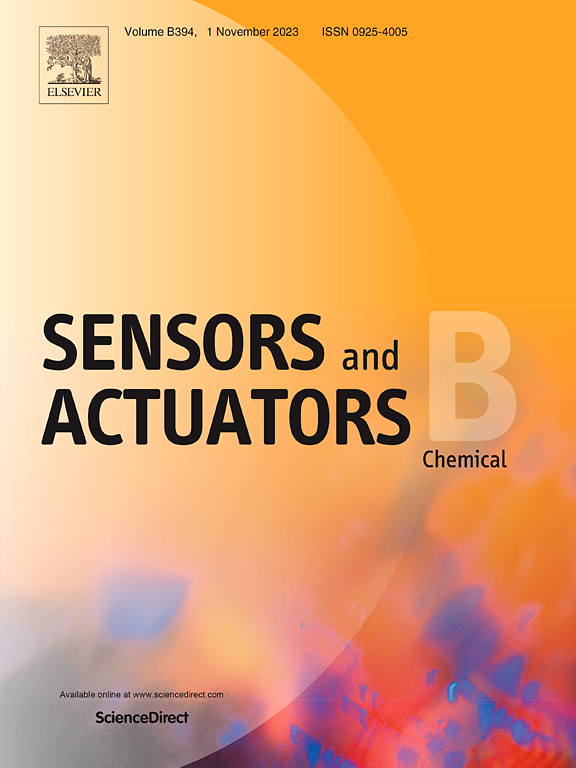A reaction-based fluorescent probe for MGO visualization and its application for in vivo imaging and drought stress monitoring in Arabidopsis thaliana
IF 8
1区 化学
Q1 CHEMISTRY, ANALYTICAL
引用次数: 0
Abstract
Methylglyoxal (MGO) is a highly reactive metabolic byproduct present in both plants and animals, closely linked to various disease developments. And fluorescent probes, with their high sensitivity, non-invasiveness, and real-time visualization, are ideal for MGO monitoring. While most existing MGO fluorescence probes are designed for applications in cells and animals, none have been applied to studying MGO levels in plants. To address this gap, we herein present a coumarin derivative fluorescent probe, CNDS, with exceptional selectivity and sensitivity to MGO. Our research demonstrated that CNDS can sensitively and selectively detect MGO in solution and has been successfully employed for imaging endogenous and exogenous MGO levels in living cells, zebrafish, and Arabidopsis thaliana. Most importantly, CNDS has successfully tracked MGO levels in Arabidopsis thaliana, indicating that high MGO levels can inhibit the root growth of Arabidopsis thaliana. Additionally, we observed that MGO levels in Arabidopsis thaliana increased when subjected to drought stress, contributing to inhibited root development and shorter root lengths. The results reveal the direct impact of MGO levels on plant growth and its potential as a key marker in drought stress studies. And our findings highlight the capability of probe CNDS as a versatile tool for monitoring MGO dynamics in plant growth and development, providing significant potential for advancing the understanding of plant growth mechanisms.
基于反应的 MGO 可视化荧光探针及其在拟南芥体内成像和干旱胁迫监测中的应用
甲基乙二酸(MGO)是一种存在于动植物体内的高活性代谢副产物,与各种疾病的发展密切相关。而荧光探针具有高灵敏度、非侵入性和实时可视化的特点,是监测 MGO 的理想选择。现有的大多数 MGO 荧光探针都是为细胞和动物的应用而设计的,但还没有一种用于研究植物中的 MGO 水平。为了填补这一空白,我们在本文中介绍了一种香豆素衍生物荧光探针 CNDS,它对 MGO 具有极高的选择性和灵敏度。我们的研究表明,CNDS 可以灵敏地选择性检测溶液中的 MGO,并已成功用于活细胞、斑马鱼和拟南芥中内源性和外源性 MGO 水平的成像。最重要的是,CNDS 成功跟踪了拟南芥中的 MGO 水平,表明高水平的 MGO 会抑制拟南芥根的生长。此外,我们还观察到,拟南芥在遭受干旱胁迫时,其 MGO 含量会增加,从而导致根系发育受抑制和根系长度缩短。这些结果揭示了 MGO 水平对植物生长的直接影响,以及其作为干旱胁迫研究关键标记的潜力。我们的研究结果突显了探针 CNDS 作为监测植物生长和发育过程中 MGO 动态的多功能工具的能力,为促进对植物生长机制的了解提供了巨大的潜力。
本文章由计算机程序翻译,如有差异,请以英文原文为准。
求助全文
约1分钟内获得全文
求助全文
来源期刊

Sensors and Actuators B: Chemical
工程技术-电化学
CiteScore
14.60
自引率
11.90%
发文量
1776
审稿时长
3.2 months
期刊介绍:
Sensors & Actuators, B: Chemical is an international journal focused on the research and development of chemical transducers. It covers chemical sensors and biosensors, chemical actuators, and analytical microsystems. The journal is interdisciplinary, aiming to publish original works showcasing substantial advancements beyond the current state of the art in these fields, with practical applicability to solving meaningful analytical problems. Review articles are accepted by invitation from an Editor of the journal.
 求助内容:
求助内容: 应助结果提醒方式:
应助结果提醒方式:


